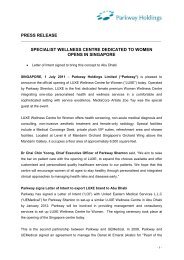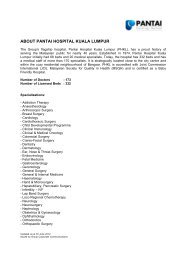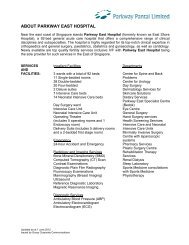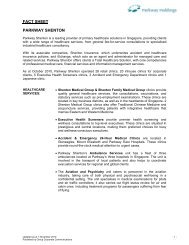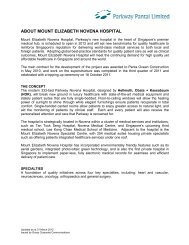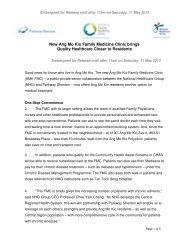Download - Parkway Pantai
Download - Parkway Pantai
Download - Parkway Pantai
You also want an ePaper? Increase the reach of your titles
YUMPU automatically turns print PDFs into web optimized ePapers that Google loves.
Iron intake protectswomen against PMSWomen with a diet rich in iron were 30 to 40 per centless likely to develop pre-menstrual syndrome (PMS)than women who consumed lower amounts, in astudy reported by researchers at the University ofMassachusetts Amherst School of Public Health andHealth Sciences, together with Harvard University.“We found that women who consumed the most nonhemeiron, the form found primarily in plant foods andin supplements, had a 30 to 40 per cent lower risk ofdeveloping PMS than women who consumed the lowestamount of non-heme iron,” says Bertone-Johnson.“The level of iron intake at which we saw a lower riskof PMS, roughly greater than 20 mg per day, is higherthan the current recommended daily allowance (RDA)for iron for premenopausal women, which is 18 mgper day,” Bertone-Johnson says. This amount may beobtained through 1 to 1.5 servings per day of ironfortifiedcereal or with supplements.“However, as high iron intake may have adverse healthconsequence, women should avoid consuming morethan the tolerable upper intake level of 45 mg per dayunless otherwise recommended by a physician,” shenotes. Iron may affect PMS because it is involved inproducing serotonin, a neurotransmitter that helps toregulate mood, she and colleagues point out.Source: Medical News Today‘Aggressive’ prostatecancer gene findResearch reveals that men with prostate cancer and aninherited faulty BRCA2 gene have the worst form ofthe disease. The BRCA2 gene is linked to hereditarybreast cancer as well as prostate and ovarian cancers.Now scientists say that on top of being more likely toget prostate cancer, men with the BRCA2 gene also havehigher chances of developing aggressive tumours andhave the poorest survival rates.Prostate cancer can grow extremely slowly or veryquickly and this is something that is hard to predictearly on. Some men may live symptom-free for alifetime, despite having this cancer. For many, treatmentis not immediately necessary. But researchers say menwith faulty BRCA2 gene and prostate cancer should betreated early and aggressively because their tumour ismore likely to spread.Professor Ros Eeles and colleagues at The Institute ofCancer Research in London and The Royal MarsdenNHS Foundation Trust found prostate cancers spreadmore quickly and were more often fatal in men who hadinherited a faulty BRCA2 gene than in men who did notinherit it.Dr Julie Sharp of Cancer Research UK, said, “We knewthat men who inherit a faulty BRCA2 gene are at agreater risk of developing prostate cancer but this is thelargest study to show that the faulty gene also makes thedisease more likely to develop quickly and spread.”Source: BBC News onlineNews Bites 07




